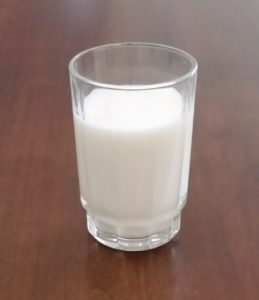 Not all foods are equal. Especially dairy milk vs alternative "milks", such as almond or oat milks. Or plant-based "meat" vs animal meat. A recent study analyzed popular plant-based "milk" and "meat" products and found that they are not nutritionally equivalent to real milk and meat.
Not all foods are equal. Especially dairy milk vs alternative "milks", such as almond or oat milks. Or plant-based "meat" vs animal meat. A recent study analyzed popular plant-based "milk" and "meat" products and found that they are not nutritionally equivalent to real milk and meat.
They contain different nutrients, amount of protein, calories, etc. The researchers concluded that eating only or mainly the plant-based substitutes can result in dietary deficiencies - that is, of nutrients found in meat and dairy.
Meat and dairy products are good sources of vitamin B12, zinc, iodine, long-chain omega fatty acid, and choline. All of these are necessary for good health. Eating cheese (a dairy product) such as Jarlsberg cheese is great for bone health because of the microbes (Proprionebacterium freudenreichii) living in the cheese and which produce vitamin K and DHNA (both necessary for bone health).
Instead of eating fake substitutes (many of which are highly processed, with lots of additives), why not focus on eating more real plant-based foods? This means eating more whole grains, seeds, nuts, legumes (beans), fruits, vegetables, and then just reduce the amount of meat and dairy eaten.
From Medical Xpress: Switching meat and milk for plant-based copies misses vital nutrients
Mitigating climate change is a key challenge of our time. One way many people try to reduce their greenhouse gas emissions is to eat less animal-source food—like meat and dairy—and instead eat more plant-based food.
But rather than transitioning to diets high in coarse grains, pulses, fruit, vegetables, nuts and seeds as recommended—people are more commonly simply swapping dairy milk for plant-based "milk" and animal meat for plant-based "meat."
Plant-based "meat" and "milk" are similar in appearance and function to the animal-source originals, so it's an easy and convenient swap to make. Most consumers perceive plant-based "milk" and "meat" as healthy.
So, what happens to our nutrient intake when these simple swaps are made?Unfortunately, it's complicated.
For one, plant-based "milk" and "meat" are not nutritionally equivalent to the animal-source versions. Additionally, plant-based foods that appear similar to each often vary widely when it comes to nutritional composition.
For example, the nutritional makeup of plant-based "milks" varies according to the base ingredient (such as almonds, oats, rice or soy), as well as by the type and level of fortification (added nutrients such as calcium) and sweetening.
To get a fuller picture, we looked at the food composition database published by Food Standards Australia New Zealand, covering 53 nutrients across 5,740 foods and beverages.
Our recent study, published in the journal Nutrients, used a computer simulation called dietary modeling to assess the likely nutritional implications of Australians swapping animal products for plant-based copies.
We modeled a scenario where the Australian population, on average, swapped approximately 2.5 meals per week of animal-source meat (beef, chicken and sausages) for plant-based "meat" and approximately one liter of dairy milk for plant-based "milks" (soy, almond, oat and rice).
We focused on the main nutrients that these "easily swappable" animal-source products contribute to our overall diet, using the full range of nutrients from our national food composition database rather than just those listed on the food labels.
Our modeling shows that the likely impact of switching varies from nutrient to nutrient—iron intake increases by 15% and unfortunately sodium intake increases by 7%, but most other nutrients decline.
Most concerning were the predicted declines in intake of vitamin B12 (19%), iodine (14%), long-chain omega-3 fatty acid (8%) and zinc (7%). These nutrients are important.
Iodine is an essential component of thyroid hormones and is critical for brain development; Vitamin B12 is important for neurological pathways and normal blood functioning; Zinc is an important component of many enzymes needed to keep us healthy; and Omega-3 has health benefits throughout life, from fetal development through to keeping our hearts and brains healthy as we age.
For example, the World Health Organization has classified the Australian population as mildly iodine deficient and women are at continued risk of iodine deficiency during pregnancy. Milk is an important source of iodine in Australia, but without fortification, plant-based milk is very low in iodine.
Vitamin B12 is present in both meat and dairy, and between 5% and 8% of females aged 14 years and over don't get enough. Switching to plant-based versions is likely to exacerbate this dietary inadequacy.
Plant-based "meat" tends to contain little or no long-chain omega-3 fatty acids.
